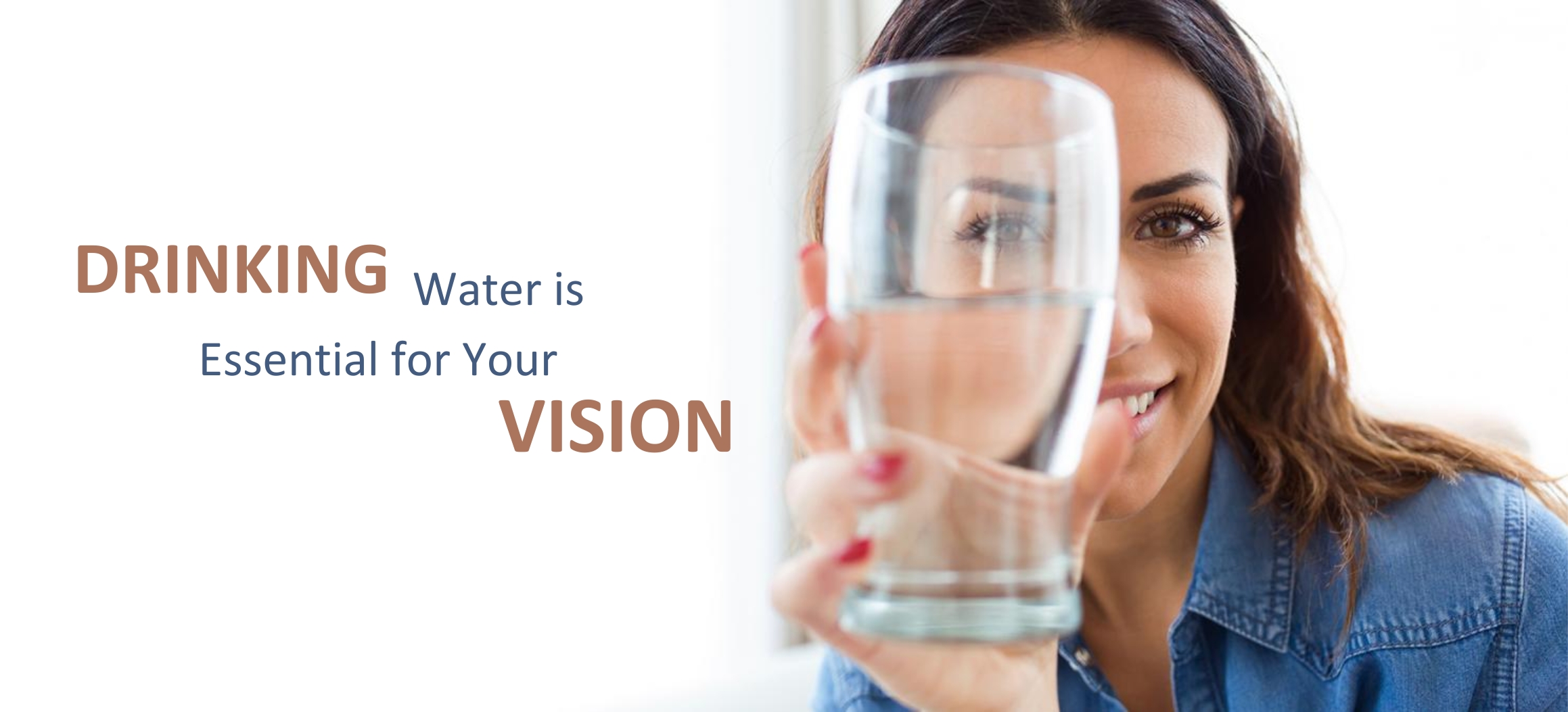
Hydration plays a fundamental role in overall health, but one area that often gets overlooked is its importance for eye health. Many people associate drinking water with skin or energy levels, but staying hydrated also significantly impacts your vision.
The Connection Between Hydration and Eye Health
Water is essential for maintaining proper body function, and the eyes are no exception. The connection between hydration and eye health is crucial, as proper hydration helps maintain the moisture balance needed for optimal eye function. When the body is well-hydrated, it supports tear production, which keeps the eyes lubricated and clear, preventing issues like dryness and irritation. Dehydration of the eyes can lead to discomfort, blurred vision, and dry eye syndrome. Drinking water and eye health are directly linked, as consistent water intake ensures that the eyes remain moist and free from irritants. In short, drinking water benefits for eyes include better tear production and overall comfort.
How Dehydration Affects Your Eyes
Dehydration can manifest in various ways, affecting every part of your body, including your eyes. The lack of sufficient water intake compromises tear production, leading to dry eyes and discomfort. This results in a range of symptoms that can affect both short-term comfort and long-term vision quality.
Dehydration often results in a condition known as dry eye syndrome, which occurs when the eyes do not produce enough tears to stay adequately moisturized. Tears are critical for maintaining eye health, and when hydration levels drop, tear production is compromised. This leads to symptoms such as dryness, irritation, and a burning sensation in the eyes. Many individuals mistakenly attribute these symptoms to external factors like environmental conditions, when in fact, the underlying cause is often dehydration from not drinking enough water. Proper hydration is essential to prevent and manage dry eye syndrome effectively.
Blurred Vision
Another impact of dehydration is blurred vision. Since the eyes rely on tears to maintain their moisture levels and clarity, when they dry out, the surface of the eyes becomes uneven, leading to blurry or fluctuating vision. This can be especially frustrating when trying to focus on tasks like reading or working on a computer.
Eye Irritation
Dehydrated eyes are more prone to irritation from allergens or environmental factors. Without proper moisture, the eyes cannot effectively flush out irritants like dust or pollen. This results in increased discomfort and, over time, can lead to inflammation or even infections.
The Importance of Tear Production for Eye Health
Tear production plays a crucial role in preserving eye health, as tears keep the eyes lubricated, protect against irritants, and help cleanse the surface of the eyes. Adequate hydration is essential for maintaining healthy tear production, ensuring that the eyes remain consistently moist and protected. Drinking water benefits for eyes include sustaining the tear film that covers the eyes, providing a clear and smooth surface essential for vision. Without proper tear production, the eyes become more susceptible to infections and other complications. Therefore, water intake is directly linked to tear production and overall eye health
How Much Water Should You Drink for Optimal Eye Health?
The amount of water needed for optimal eye health can vary depending on factors such as age, body weight, climate, and activity level. As a general guideline, most individuals are advised to consume at least eight glasses of water per day. However, in dry climates or for those with higher levels of physical activity, more water may be necessary.
Signs That Dehydration Is Impacting Your Vision
Recognizing the signs of dehydration in your eyes is essential for preventing long-term damage. Symptoms such as dry or sticky eyes, blurred vision, sensitivity to light, and persistent eye irritation are all indications that you may not be drinking enough water. Dehydration can also cause discomfort for those who wear contact lenses, as the lenses rely on a moist surface to sit comfortably on the eyes. When the eyes are dehydrated, wearing contacts can become painful or irritating. Increasing your water intake can help alleviate these symptoms, ensuring that your vision remains clear and your eyes comfortable.
Hydration Tips to Keep Your Eyes Healthy
Maintaining proper hydration for your eyes involves more than just drinking water. While consuming an adequate amount of water is critical, you can also support eye hydration by using artificial tears or humidifiers in dry environments. These tools help to counteract the effects of air conditioning, heaters, or dry weather, which can contribute to dehydration of eyes. Another important tip is to include water-rich foods in your diet. This ensures that your body receives hydration from multiple sources, which can further support your eye health. Recognizing the relationship between water and eye health is vital and developing consistent hydration habits will help preserve your vision over time.
Foods Rich in Water Content That Support Eye Health
Incorporating foods with high water content into your diet is another effective way to support eye health. Fruits and vegetables such as cucumbers, watermelon, oranges, and tomatoes are not only rich in water but also provide essential vitamins and minerals that promote overall health. These foods contribute to keeping your body hydrated, which directly impacts your eyes. A balanced diet that includes such water-rich foods complements the benefits of drinking water, further enhancing your ability to maintain hydrated, healthy eyes.
The Long-Term Benefits of Staying Hydrated for Your Vision
Staying hydrated on a consistent basis offers significant long-term benefits for your eyes. Regular hydration reduces the risk of developing chronic dry eye syndrome and helps maintain clear, sharp vision. Proper hydration supports healthy tear production, which reduces the likelihood of infections or irritation. Drinking water and eye health are closely linked and ensuring that you stay hydrated is one of the most straightforward ways to protect your vision over the years. Consistent hydration habits, along with a balanced diet rich in water-filled foods, can help you avoid the discomfort and risks associated with dehydration, ensuring the long-term health of your eyes
FAQ
The most common symptoms include a gritty sensation in the eyes, itchiness, burning, and light sensitivity. You may also notice blurred vision and discomfort when wearing contact lenses.
Chronic dehydration can lead to conditions such as dry eye syndrome and recurrent eye infections due to the lack of adequate tear production. Prolonged dehydration of eyes may also increase the risk of developing more severe eye problems over time.
Proper hydration is critical for maintaining tear production. Drinking water benefits for eyes include supporting the glands that produce tears, ensuring that the eyes stay moisturized and protected from irritants.
Improvements can vary depending on the severity of dehydration. In most cases, within a few days of increasing your water intake, you may notice less eye irritation, improved comfort, and clearer vision. However, maintaining consistent hydration is key to sustaining these benefits in the long-term.
Categories
Company
Media
Follow Us
© Copyright Biotech /Terms Of Use - Privacy Policy
Version 2_CT_1212222
